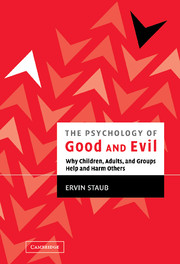Book contents
- Frontmatter
- Contents
- Preface
- Acknowledgments
- PART I INTRODUCTION AND CORE CONCEPTS
- PART II THE ROOTS OF HELPING OTHER PEOPLE IN NEED IN CONTRAST TO PASSIVITY
- PART III HOW CHILDREN BECOME CARING AND HELPFUL RATHER THAN HOSTILE AND AGGRESSIVE
- PART IV THE ORIGINS OF GENOCIDE, MASS KILLING, AND OTHER COLLECTIVE VIOLENCE
- PART V THE AFTERMATH OF MASS VIOLENCE: TRAUMA, HEALING, PREVENTION, AND RECONCILIATION
- PART VI CREATING CARING, MORALLY INCLUSIVE, PEACEFUL SOCIETIES
- 44 Changing Cultures and Society
- 45 Transforming the Bystanders: Altruism, Caring, and Social Responsibility
- 46 Blind versus Constructive Patriotism: Moving from Embeddedness in the Group to Critical Loyalty and Action
- 47 Manifestations of Blind and Constructive Patriotism: Summary of Findings
- 48 The Ideal University in the Real World
- 49 Conclusion: Creating Caring Societies
- Appendix: What Are Your Values and Goals?
- Index
- References
48 - The Ideal University in the Real World
Published online by Cambridge University Press: 07 May 2010
- Frontmatter
- Contents
- Preface
- Acknowledgments
- PART I INTRODUCTION AND CORE CONCEPTS
- PART II THE ROOTS OF HELPING OTHER PEOPLE IN NEED IN CONTRAST TO PASSIVITY
- PART III HOW CHILDREN BECOME CARING AND HELPFUL RATHER THAN HOSTILE AND AGGRESSIVE
- PART IV THE ORIGINS OF GENOCIDE, MASS KILLING, AND OTHER COLLECTIVE VIOLENCE
- PART V THE AFTERMATH OF MASS VIOLENCE: TRAUMA, HEALING, PREVENTION, AND RECONCILIATION
- PART VI CREATING CARING, MORALLY INCLUSIVE, PEACEFUL SOCIETIES
- 44 Changing Cultures and Society
- 45 Transforming the Bystanders: Altruism, Caring, and Social Responsibility
- 46 Blind versus Constructive Patriotism: Moving from Embeddedness in the Group to Critical Loyalty and Action
- 47 Manifestations of Blind and Constructive Patriotism: Summary of Findings
- 48 The Ideal University in the Real World
- 49 Conclusion: Creating Caring Societies
- Appendix: What Are Your Values and Goals?
- Index
- References
Summary
introduction
What might the ideal university be like? Not the ideal university in a nonexistent ideal world, but in the real world of today, in the U.S. How might the University of Massachusetts strive to become an ideal university?
We must consider and specify core values that the university ought to transmit to students and core values that the university ought to embody in the way it functions. We must also consider how these values are to be fulfilled, how they are to be implemented. I will first specify and discuss core values, and then methods or means of their implementation.
Rarely do institutions (or individuals) specify and consciously examine the values they strive to fulfill. To do so has substantial benefits. It is difficult to move toward desired ends, to fulfill one's purpose without knowing that purpose. For example, if a university hopes to transmit certain values to students, clearly specifying what they are is essential to develop optimal ways to transmit them.
Decision making is difficult enough when values and goals are explicit. When decision making is based on implicit values, as it often is, the force of circumstance and conflicting interests (especially when they join with conflicting although less essential values) make it much easier to disregard or submerge essential values. Doing so repeatedly, in specific instances, can lead over time to a drift away from these values.
- Type
- Chapter
- Information
- The Psychology of Good and EvilWhy Children, Adults, and Groups Help and Harm Others, pp. 516 - 530Publisher: Cambridge University PressPrint publication year: 2003



